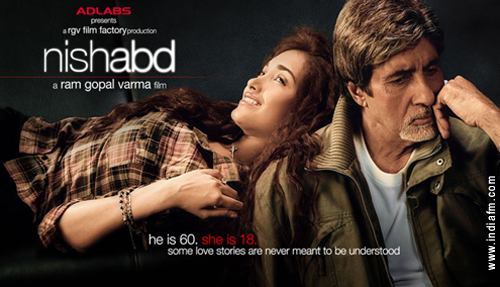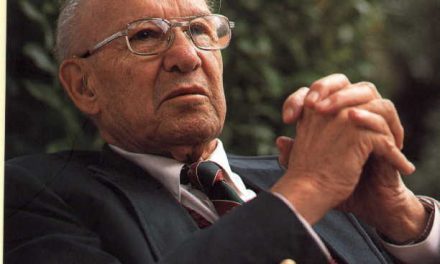 Vijay suffers from a perceived loss of life. He misses something and Jiah is supposedly the answer to the meaningless of life. But, why do we have to be constantly told that life (and love) tends to go stale within the confines of traditional/conventional marriage? Karan Johar’s /Kabhi Alvida Na Kehna (KHNK) also dealt with same theme, writes Sam Thambusamy.
Vijay suffers from a perceived loss of life. He misses something and Jiah is supposedly the answer to the meaningless of life. But, why do we have to be constantly told that life (and love) tends to go stale within the confines of traditional/conventional marriage? Karan Johar’s /Kabhi Alvida Na Kehna (KHNK) also dealt with same theme, writes Sam Thambusamy.
Even as I begin to write this, I ask myself, “Do we really need to take Nishabd seriously? It’s unconventional storyline – that of a sixty year old falling in love with an eighteen year old – is the next bold theme from the Bollywood dream factory. But, you can’t take this movie as dealing with a bold and/or unconventional theme. In my opinion, the movie assaults our imagination by going beyond artistic, if not moral sensibilities. Nishabd is a morality play and we, as a society, would do better if we treat it that way. I am personally appalled at the central thesis of the movie, let alone its Freudian subtext. I wonder what our children make out of this film. Even if one is not planning to watch the movie, the ‘promos’ are all over the place and you get to see it (and so do our children) even if you don’t want to. I think, we should not let this one go without a protest and so I write.
The idea of a sixty year old falling for an eighteen year old, let alone his daughter’s friend, is ridiculous. There’s no nice way to say this. It looks like both RGV and Amitabh are testing a private theory in public space. The movie is supposedly about “pure” love but it has only become a vehicle for displaying the female body image. It is not just the ‘age-factor’ here that is ‘ridiculous’ but rather the blurring of personal moral fences and the consequent collapse of familial relationships.
RGV’s creative intent has shades of American Beauty and Lolita (1997) but thankfully we are saved the disgust of pedophilia (maybe only because we aren’t ready for it as yet). In Lolita, Humbert is a middle-aged sexual pervert who romances a twelve-year-old girl. In American Beauty, Lester’s crush for his daughter’s friend is to escape the drudgery of life. In Nishabd, we are not told why the sixty-year-old Vijay gets involved with Jiah – his daughter’s friend. It is unfortunate that Ram Gopal Verma does not deal with the social and the psychological motives for this ‘destructive’ love (but for political correctness we can as well call it lust).
Why would the sixty-year-old Vijay fall for his daughter’s friend? If we go strictly by the storyline, the attraction is not physical/sexual. You can’t blame Jiah entirely. Vijay is not a sexual pervert. We are told that some love stories are never meant to be understood. The question is, “ Do we understand what love is in the first place? Agreed, Vijay is not physically/sexually attracted to Jiah. But, you can’t deny the metaphorical sexual situations. Even as audiences slowly identify with Vijay’s vulnerabilities, RGV provides fodder for the male fantasy with the power of the visual. In fact, the physical/sexual motive is brought through the viewer’s perspective.
Vijay’s ‘feelings’ extend beyond the film and this may set an unhealthy trend. What if audiences transform the ‘reel’ experience into ‘real’ life? Sexual abuse of younger women, particularly of teenage girls, is commonplace (remember the horrific Nithari killings). /Nishabd/ only advances a potentially dangerous idea. I think we must see it for what it is (and what it’s worth). It is a movie about inner struggles of a reclusive individual, his guilt trap and the consequent loss of life. Vijay is led to believe that ‘real’ life is elsewhere – outside a tried and tested marriage and trusted familial relationships. Blame it on Jiah but the loss of life is his own making.
Vijay suffers from a perceived loss of life. He misses something and Jiah is supposedly the answer to the meaningless of life. But, why do we have to be constantly told that life (and love) tends to go stale within the confines of traditional/conventional marriage? Karan Johar’s /Kabhi Alvida Na Kehna (KHNK) also dealt with same theme. Nishabd, unlike KHNH, deals with the theme of finding ‘true’ love when you are happily married.
Can we name Vijay’s feeling for Jiah as love? Is it a late-in-life infatuation or disguised flirtation (or both)? A thoughtless ‘follow-your-own-heart’ approach entraps him in a self-perpetuating guilt cycle. Vijay, like most of us, does not realize ‘feelings’ can be self-destructive. Vijay’s feelings for Jiah destroy him as much as it tears apart the once happy family. Vijay is unable to handle the guilt as much as he is unable to handle his vulnerability and he is driven to consider suicide. Worse, he decides to spend the rest of his life with memories of Jiah.
There is no need to be caught in the guilt trap and live your life as a prisoner of your fantasy. What does it take to start life all over again? Vijay desperately needs to forgive himself, as much he needs to be forgiven – by his daughter and wife. It is here that he falters. Vijay confides with his wife his feelings for Jiah but does not feel sorry for betraying their trust and for severing their relationships. Rather than seeking new life he decides to be drowned in guilt. I would have asked him to watch Shall we dance? (2004) and may be Vijay can take a cue from John Clark (played by Richard Gere) on how he transformed his life as well as his marriage.
It is unfortunate that Vijay does not seek to transcend and redeem an otherwise meaningless life. He prefers to treat the symptoms rather than deal with the disease itself. Vi
jay perfectly symbolizes our societal predicament. Bollywood can function either as a smokescreen or as a mirror. Nishabd works both ways. In Vijay, everyman finds himself. We are reminded of our desires, our inner struggles, our vulnerabilities, our fragility and our fantasies.
If we are honest with ourselves, it isn’t easy to point our finger at Vijay. We live in a world of images. We also seek images to feed our fantasies (be it the reel world or in the real world). We turn to the Internet, magazines and movies to play out our fantasies. Few like Vijay get to deal with the vulnerabilities in real life.
The film not only points a finger at its audiences but it also raises questions: How do we deal with our ‘feelings’? How do we play out our fantasies? How do we decide between right and wrong? How do we cope with the perceived loss of life? The answers we bring to these questions will determine the future course of our society.
Nishabd has sparked a debate. But, it is surely an opportunity for surgical intervention. Hopefully, the debate will lead us to the diagnosis of our societal disease.
{moscomment}








Excellent article. All mainline film makers have been guilty of subtly glorifying what they appeal audience to abhor, whether its crime or lust. RGV has not been any exception to this. Current day bollywood is yet to see a director who claims to make serious films, remains true to what he is showing, and yet becomes successful.
To,
The site owners/ Mr. Sam Thambusamy,
Sirs,
The writer in his intro itself says, “Do we really need to take Nishabd seriously? Its unconventional storyline” then say all sorts of things. It’s amazing to note that publishing such stuff what benefit a Christian reader get out of it? “Is it a movie review web site or a Christian Web site? Please publish some value added Christian articles for the benefit of the Christian readers. Please don’t just waste your precious time for the movie reviews and its analysis. Let such stuff be in the movie magazines or sites. Brothers, Use your precious time and talent for the glory of God. His coming is very near. Pl. don’t waste your precious talents.
Ann, Secunderabad
I appreciate for raising a voice against such an infectious movie. This is very much our job. Can we “glorify God” by being quiet on these assaults? Did John the Baptist lost his life stupidly by confronting Herod for his illegal relationship with Herodias? Are we going to say he would have glorified God by keeping quiet on that?
Dear Eben,
It’s really sad to note that you are carried away by a false notion. Br, it’s not your job or our job to write film reviews, of course if you are a journalist for a film mag or such publication you must and it’s your duty. But if you are a believer in Christ it’s not your business at all. Yes, definitely, by keeping quite you can glorify God. No explanation is needed for this. We are living in such a world that we have to face such situations. It’s their business and after all it’s a secular movie stuff why we should worry about such things. Our business is to tell them about the real fact which we know and hold. Not to criticize. Jesus Christ said, “You are the light of the world… Let your light shine before men in such a way that they may see your good works, and glorify your father who is in heaven. Matt.5:14 &16. Let us not criticize. Let them do their business. Let us do our business. Thambushetty’s piece was purely a film review. Why such review in a so called christen site. It’s very, very sad.
ANN, Secunderabad
Dear ANN SECUNDERABAD,
Please pray over these words of yours: “It’s their business and after all it’s a secular movie stuff why we should worry about such things.”
As the Rajni Mania article has emphasised, movies do affect people, especially in India, more so in AP & TN where politicians are made from it.
Having been a film journalist & a film maker, I personally know that a VAST majority of people live from Friday to Friday, with every new release. What is your good news to them? “Don’t watch movies”?
Is your “christianity” restricted to the “righteous” you have been taught to model on from the sunday church, or does it extend to the “sinner” (taking off from your peculiar understanding that watching/writing about movies is unchristian) Jesus came to save?
Please pray about it, sis.
Hi dear bros and sis,
Like bro. Ebenezer, I too think it is not a sin to talk about the current trends of the cine industry. The point is to ensure that we are holding the relationship with our saviour and enjoy the fellowship with Him. If we are going to make these film reviews at the expense of the relationship with Christ – no more explanations needed. We are going crazy.
At the same time it is certainly not bad either to be ignorant about these crap things which never cease to exist. It is better to be known as a mad for Christ than to be an intellect to the world.
I think there’s no need to be dissappointed because of the review.
i have read few comments made by ann and other brother.it is a wrong concept that christians are called to sit in church and pray and pray.dont u read bible where prophets spoke against the sins of society>dont u see jesus himself did that? bad movies always lead majority to sin so if we christians are salient then who is GOING TO SPEAK FOR TRUTH? brothers dont act as angels ,gospel is for sinners and broken world .our readers need to know what is happening in our world and make them to to face the facts /